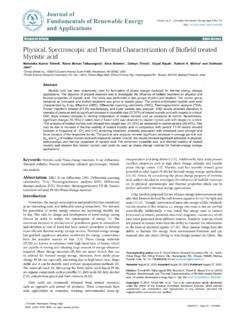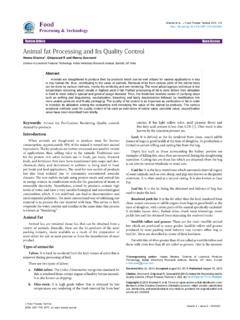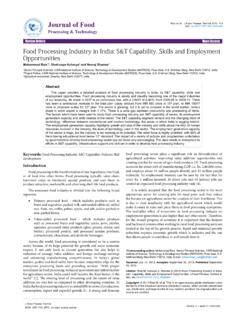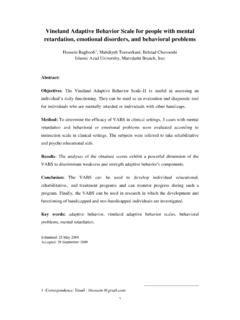Transcription of Utility of the Vineland Adaptive Behavior Scales in ...
1 Volume 7 Issue 4 1000213 Autism Open Access, an open access journalISSN: 2165-7890 Open AccessResearch ArticleAutism - Open AccessAutism: OpenAccessISSN: 2165-7890 Law and Aguila, Autism Open Access 2017, 7:4 DOI: : Autism spectrum disorder; Adaptive skills; CognitivefunctionIntroductionAutism spectrum disorder is a chronic and pervasive neurodevelopmental disorder characterized by impairments in social interaction, social communication and restricted and repetitive patterns of behaviour, interests and activities that arise in early childhood or when social demands exceed limited capacities [1]. Children with ASD present with a wide range of variability in symptom severity, cognitive ability, and Adaptive behaviour.
2 It is estimated that about 30-50% of children with ASD have co-occurring intellectual disability [2,3]. Cognitive testing is an important part of the evaluation of children with ASD and is helpful in planning educational and treatment programs. Emerging evidence shows that the cognitive status of toddlers with ASD closely predicts how they function as adults [4-6]. Additionally, childhood cognitive status has been found to be stable across the lifespan in people with ASD [7] and can be used as a reliable predictor of cognitive functioning in adulthood [5]. The intellectual assessment of children with ASD is not a straightforward process [8].
3 In certain circumstances, testing may not be completed due to difficulties in communication, social interaction, transitions and motivation, which are characteristic of the disorder. A valid IQ or cognitive score depends on the competence of the person testing the children and whether cooperation and attention of the child have been established [9]. Thus, results of cognitive skills assessment may sometimes be a minimum estimate of a child s ability. Adaptive behaviour is the ability to translate cognitive potential into real life skills [10]. Measures of Adaptive behaviours, such as the Vineland Adaptive Behavior Scales -II [11,12], evaluate Adaptive functioning in different domains such as communication, daily living skills and socialization.
4 It utilizes a survey interview form based on caregiver reports and does not require an individual to respond to an examiner or perform Behavior is highly correlated to cognitive skills on various psychological instruments and is believed to reflect higher cognitive ability [13]. Ray-Subramanian et al. [13] demonstrated that Vineland -II and Bayley-III cognitive scores were significantly correlated. Likewise, a comparison of the VABS-II Adaptive behaviour composite standard score and the cognitive score obtained from the Bayley-III showed no statistical difference between the two measures [14,15].
5 On the other hand, a study comparing the Wechsler Preschool and Primary Scales of Intelligence, 4th edition (WPPSI-IV) and Vineland -II showed that certain Adaptive behaviour domain scores ( daily living skills) share high correlation with all WPPSI-IV composite scores [16]. *Corresponding author: Evelyn L, Paediatric Medicine, Singapore 119228,Singapore, Tel: +65 9321 1369; E-mail: Received May 24, 2017; Accepted June 06, 2017; Published June 13, 2017 Citation: Law ECN, Aguila GDJ (2017) Utility of the Vineland Adaptive Behavior Scales in Predicting Future Cognitive Function in Children with Autism Spectrum disorders.
6 Autism Open Access 7: 213. : 2017 Law ECN, et al. This is an open-access article distributed under the terms of the Creative Commons Attribution License, which permits unrestricted use, distribution, and reproduction in any medium, provided the original author and source are of the Vineland Adaptive Behavior Scales in Predicting Future Cognitive Function in Children with Autism Spectrum disordersEvelyn Chung Ning Law* and Genalyn De Jesus Aguila National University Singapore Yong Loo Lin School of Medicine, SingaporeAbstractObjective: Literature shows that cognitive function of a child with autism spectrum disorder (ASD) is positively associated with later outcomes.
7 However, developmental and cognitive assessments have not been consistently completed at the time of diagnosis in many clinical settings. It is uncertain whether a standardized parent Adaptive questionnaire will help predict later cognitive functioning. This study explored the Utility of a standardized questionnaire in predicting future cognitive functioning in children with : Children aged 24 to 59 months consecutively diagnosed with ASD from January 2011 to October 2013, and had a cognitive assessment completed at a later time point, were included in the study (N=113). Descriptive data on demographic characteristics, Autism Diagnostic Observation Schedule (ADOS) scores, Vineland Adaptive Behavior Scales -II (VABS-II) standard scores at the time of ASD diagnosis and later cognitive scores of the cohort were presented.
8 VABS-II standard scores at the time of diagnosis were used to predict best estimate nonverbal cognitive scores using linear regression models, after controlling for gender, race, age at diagnosis, and ADOS : In this cohort, were boys and the mean age of diagnosis was months. The Adaptive behaviour profile of the study population showed motor skills>communication>daily living>socialization skills, consistent with previous studies on verbal children with ASD. The VABS-II Adaptive behaviour composite score and all the VABS-II domain scores at the time of diagnosis significantly predict later cognitive functioning.
9 The Adaptive behaviour composite score best predicts later nonverbal cognitive standard scores (p< , R2= ). The age at diagnosis and ADOS social score were also predictors of later nonverbal IQ : In clinical settings where cognitive assessments cannot be completed at the time of diagnosis, there may be Utility in using the VABS-II to better understand the cognitive functioning of children with : Law ECN, Aguila GDJ (2017) Utility of the Vineland Adaptive Behavior Scales in Predicting Future Cognitive Function in Children with Autism Spectrum disorders. Autism Open Access 7: 213. 2 of 4 Volume 7 Issue 4 1000213 Autism Open Access, an open access journalISSN: 2165-7890In individuals who cannot be assessed by standard cognitive tests, the developmental level had been estimated by measures of Adaptive behaviour in prior research [5].
10 Despite a number of researches showing the correlation between Adaptive Behavior and cognitive ability using cross-sectional studies at one time point, it has not been examined whether early Adaptive skills in children with ASD can be used to estimate future cognitive functioning longitudinally. This will be the first study to understand whether a standardized Adaptive behaviour questionnaire obtained at the time of ASD diagnosis predicts cognitive function at a later time identified 113 consecutive patients (100 boys and 13 girls) aged 24 to 98 months who were diagnosed with ASD from January 2011 to October 2013 and had completed a cognitive assessment at a later date (Figure 1).



















